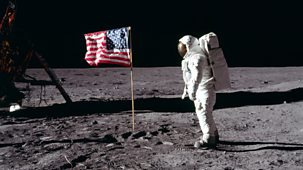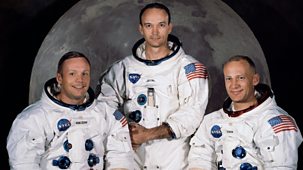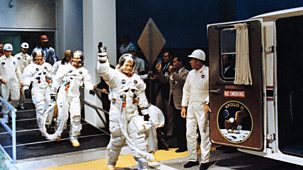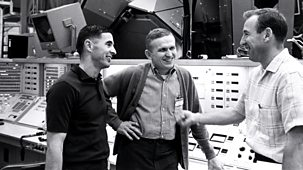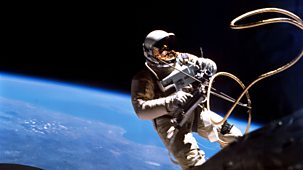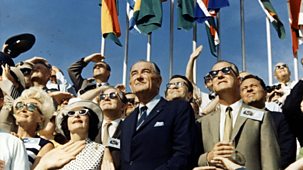
Series 1: 1. A Place Beyond the Sky - Part 1
On 4 October 1957, Soviet scientists launched Sputnik 1 - a beach ball-sized, radio-transmitting aluminium alloy sphere - into orbit. The satellite caused a sensation. Amid Cold War tensions, the Soviet Union’s accomplishment signalled a dramatic technological advantage and American felt it had little choice but to join the Space Race. \n\nThen on 12 April 1961, the Soviets sealed their advantage when cosmonaut Yuri Gagarin became the first man to orbit the Earth. John F Kennedy, the newly elected president, was faced with the issue of how to respond. Two days later, he called a meeting to find an American space programme that would promise equally dramatic results. Rocket manufacturer, and former Nazi, Wernher von Braun, convinced Kennedy that the Americans could beat the Russians to the Moon before the decade was out and the Saturn programme was born.\n\nA film By Robert Stone.\n\nA Robert Stone Production for American Experience WGBH/PBS in association with Arte France.
Source: BBC 4
Most recent episodes of Chasing the Moon
Chasing The Moon
Series 1: 6. Magnificent Desolation - Part 2
Viewers from around the world watched the flickering black-and-white footage from a camera placed on the module showing Armstrong gingerly stepping down its ladder. ‘OK, I ...
07-05-2024
BBC 4
Chasing The Moon
Series 1: 5. Magnificent Desolation - Part 1
After the immediate celebration of 1968’s successful Apollo 8 mission, underlying questions about the space programme emerged with new intensity as politicised young Ameri ...
07-05-2024
BBC 4
Chasing The Moon
Series 1: 4. Earthrise - Part 2
In the aftermath of the deadly Apollo 1 fire, Nasa faced harsh scrutiny. The horror of the first casualties at Cape Kennedy led Americans to increasingly question the very premi ...
30-04-2024
BBC 4
Chasing The Moon
Series 1: 3. Earthrise - Part 1
What exactly was it going to take for America to beat the Soviets to the moon? Cold War tensions persisted, as rumours circulated that the Soviets were preparing to send an unma ...
30-04-2024
BBC 4
Chasing The Moon
Series 1: 2. A Place Beyond The Sky - Part 2
Under von Braun’s leadership, America’s technology finally seemed to be catching up with the Soviet Union’s. On 5 May 1961, von Braun’s Redstone rocket s ...
23-04-2024
BBC 4
Chasing The Moon
Series 1: 1. A Place Beyond The Sky - Part 1
On 4 October 1957, Soviet scientists launched Sputnik 1 - a beach ball-sized, radio-transmitting aluminium alloy sphere - into orbit. The satellite caused a sensation. Amid Cold ...
23-04-2024
BBC 4
Most popular episodes of Chasing the Moon
Chasing The Moon
Series 1: 6. Magnificent Desolation - Part 2
Viewers from around the world watched the flickering black-and-white footage from a camera placed on the module showing Armstrong gingerly stepping down its ladder. ‘OK, I ...
07-05-2024
BBC 4
Chasing The Moon
Series 1: 2. A Place Beyond The Sky - Part 2
Under von Braun’s leadership, America’s technology finally seemed to be catching up with the Soviet Union’s. On 5 May 1961, von Braun’s Redstone rocket s ...
23-04-2024
BBC 4
Chasing The Moon
Series 1: 1. A Place Beyond The Sky - Part 1
On 4 October 1957, Soviet scientists launched Sputnik 1 - a beach ball-sized, radio-transmitting aluminium alloy sphere - into orbit. The satellite caused a sensation. Amid Cold ...
23-04-2024
BBC 4
Chasing The Moon
Series 1: 5. Magnificent Desolation - Part 1
After the immediate celebration of 1968’s successful Apollo 8 mission, underlying questions about the space programme emerged with new intensity as politicised young Ameri ...
07-05-2024
BBC 4
Chasing The Moon
Series 1: 3. Earthrise - Part 1
What exactly was it going to take for America to beat the Soviets to the moon? Cold War tensions persisted, as rumours circulated that the Soviets were preparing to send an unma ...
30-04-2024
BBC 4
Chasing The Moon
Series 1: 4. Earthrise - Part 2
In the aftermath of the deadly Apollo 1 fire, Nasa faced harsh scrutiny. The horror of the first casualties at Cape Kennedy led Americans to increasingly question the very premi ...
30-04-2024
BBC 4


